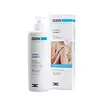What's inside
What's inside
 Key Ingredients
Key Ingredients

 Benefits
Benefits

 Concerns
Concerns

 Ingredients Side-by-side
Ingredients Side-by-side

Urea
BufferingLanolin
EmollientParaffin
PerfumingCetearyl Alcohol
EmollientPEG-20 Stearate
EmulsifyingGlyceryl Stearate
EmollientDecyl Oleate
EmollientGlycerin
HumectantPhenoxyethanol
PreservativeSodium PCA 50%
HumectantButyrospermum Parkii Butter
Skin ConditioningBenzyl Alcohol
PerfumingDimethicone
EmollientTocopheryl Acetate
AntioxidantPanthenol
Skin ConditioningWater
Skin ConditioningUrea
BufferingCetearyl Ethylhexanoate
EmollientPanthenol
Skin ConditioningGlyceryl Stearate
EmollientPEG-40 Stearate
EmulsifyingGlycerin
HumectantDimethicone
EmollientPersea Gratissima Oil
Skin ConditioningShorea Stenoptera Seed Butter
EmollientPhenoxyethanol
PreservativeCetyl Alcohol
EmollientOctyldodecanol
EmollientCarbomer
Emulsion StabilisingPalmitic Acid
EmollientStearic Acid
CleansingDisodium EDTA
Ethylhexylglycerin
Skin ConditioningParfum
MaskingSodium Hydroxide
BufferingBHT
AntioxidantLactic Acid
BufferingLimonene
PerfumingHexyl Cinnamal
PerfumingAlpha-Isomethyl Ionone
PerfumingLinalool
PerfumingBenzyl Salicylate
PerfumingEugenol
PerfumingCitral
PerfumingHydroxycitronellal
PerfumingCoumarin
PerfumingWater, Urea, Cetearyl Ethylhexanoate, Panthenol, Glyceryl Stearate, PEG-40 Stearate, Glycerin, Dimethicone, Persea Gratissima Oil, Shorea Stenoptera Seed Butter, Phenoxyethanol, Cetyl Alcohol, Octyldodecanol, Carbomer, Palmitic Acid, Stearic Acid, Disodium EDTA, Ethylhexylglycerin, Parfum, Sodium Hydroxide, BHT, Lactic Acid, Limonene, Hexyl Cinnamal, Alpha-Isomethyl Ionone, Linalool, Benzyl Salicylate, Eugenol, Citral, Hydroxycitronellal, Coumarin
 Reviews
Reviews

Ingredients Explained
These ingredients are found in both products.
Ingredients higher up in an ingredient list are typically present in a larger amount.
Dimethicone is a type of synthetic silicone created from natural materials such as quartz.
What it does:
Dimethicone comes in different viscosities:
Depending on the viscosity, dimethicone has different properties.
Ingredients lists don't always show which type is used, so we recommend reaching out to the brand if you have questions about the viscosity.
This ingredient is unlikely to cause irritation because it does not get absorbed into skin. However, people with silicone allergies should be careful about using this ingredient.
Note: Dimethicone may contribute to pilling. This is because it is not oil or water soluble, so pilling may occur when layered with products. When mixed with heavy oils in a formula, the outcome is also quite greasy.
Learn more about DimethiconeGlycerin is already naturally found in your skin. It helps moisturize and protect your skin.
A study from 2016 found glycerin to be more effective as a humectant than AHAs and hyaluronic acid.
As a humectant, it helps the skin stay hydrated by pulling moisture to your skin. The low molecular weight of glycerin allows it to pull moisture into the deeper layers of your skin.
Hydrated skin improves your skin barrier; Your skin barrier helps protect against irritants and bacteria.
Glycerin has also been found to have antimicrobial and antiviral properties. Due to these properties, glycerin is often used in wound and burn treatments.
In cosmetics, glycerin is usually derived from plants such as soybean or palm. However, it can also be sourced from animals, such as tallow or animal fat.
This ingredient is organic, colorless, odorless, and non-toxic.
Glycerin is the name for this ingredient in American English. British English uses Glycerol/Glycerine.
Learn more about GlycerinGlyceryl Stearate is a mix of glycerin and stearic acid.
It is used to stabilize the mixing of water and oil ingredients. By preventing these ingredients from separating, it can help elongate shelf life. It can also help thicken the product's texture.
As an emollient, it helps soften skin and supports barrier-replenishing ingredients.
In cosmetics, Glyceryl Stearate is often made from vegetable oils or synthetically produced.
This ingredient may not be fungal-acne safe
Fun fact: The human body also creates Glyceryl Stearate naturally.
Learn more about Glyceryl StearatePanthenol is a common ingredient that helps hydrate and soothe the skin. It is found naturally in our skin and hair.
There are two forms of panthenol: D and L.
D-panthenol is also known as dexpanthenol. Most cosmetics use dexpanthenol or a mixture of D and L-panthenol.
Panthenol is famous due to its ability to go deeper into the skin's layers. Using this ingredient has numerous pros (and no cons):
Like hyaluronic acid, panthenol is a humectant. Humectants are able to bind and hold large amounts of water to keep skin hydrated.
This ingredient works well for wound healing. It works by increasing tissue in the wound and helps close open wounds.
Once oxidized, panthenol converts to pantothenic acid. Panthothenic acid is found in all living cells.
This ingredient is also referred to as pro-vitamin B5.
Learn more about PanthenolPhenoxyethanol is a preservative that has germicide, antimicrobial, and aromatic properties. Studies show that phenoxyethanol can prevent microbial growth. By itself, it has a scent that is similar to that of a rose.
It's often used in formulations along with Caprylyl Glycol to preserve the shelf life of products.
Urea is also called carbamide and is the diamide of carbonic acid. In cosmetics, urea is used to hydrate the skin. It also provides exfoliation in higher concentrations.
As a humectant, urea helps draw moisture from the air and from deep within the skin. This helps hydrate your skin. Studies show urea is an effective moisturizer for dry skin conditions. 40% urea is typical in medications for treating eczema and other skin conditions.
Urea has the strongest exfoliation effect in concentrations higher than 10%. It is a keratolytic agent, meaning it breaks down the keratin protein in the top layer of skin. This helps remove dead skin cells and flaking skin.
In medicine, urea has been shown to help increase the potency of other ingredients, such as fungal treatments.
Humans and animals use urea to metabolize nitrogen-containing compounds. Urea is highly soluble in water. Once dissolved, it is neither acidic nor alkaline.
Learn more about Urea